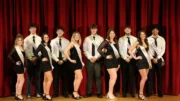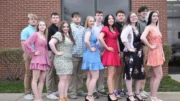The Associated Press
If you’re worried cloud cover will obscure or even obliterate your view of Monday’s total eclipse of the sun — or near total eclipse in Pittsburgh — don’t look to the country’s most fabled weather expert, Punxsutawney Phil, for help.
It turns out, in weather forecasting, predicting where and how much cloud cover you’ll have at a particular time — say 2:35 p.m. Monday when the maximum 81 percent solar eclipse will be visible here — in a particular place is incredibly difficult, much more difficult from whether there will be six more weeks of winter or not.
The current forecast for the Pittsburgh region Monday ranges from “sunny” to the dreaded “partly cloudy” skies. That could be good, or bad, depending on where you are. It is similar to the national forecast along the route where the total eclipse will be visible from Newport, Ore. to Charleston, S.C.: Generally good viewing, with a dose of uncertainty.
But that is typical of cloud forecasting.
“It is very uncertain,” said Thomas Haiden, principal scientist for the European Centre for Medium-Range Weather Forecasts, which is based in London. “Cloudiness is something very non-linear to predict because of the threshold factor.”
“You need 100 percent humidity [for clouds to be created]. But it’s not like if you’re 5 percent off in your humidity forecast you’ll be 5 percent off in cloudiness,” said Mr. Haiden, lead author of a 2015 journal article assessing the skills of cloudiness forecasting in Europe.
Even if the forecasters and your cell phone’s weather app do get it right and the forecast calls for clouds in a given region, he said: “It’s not the individual cloud that they’re trying to predict.”
No forecast this weekend will be able to say with 100 percent certainty whether there will be a cloud that obscures your view of the eclipse. That is true here or anywhere else during the eclipse’s 90-minute run across the U.S. — the only country on earth, by the way, where the total eclipse will be visible.
“If you ask me: ‘Is it going to rain in Pittsburgh this weekend?’ I can say, ‘Yeah, it’s going to rain sometime Saturday night,’ “ said Bob Oravec, lead forecaster with the National Weather Service’s Weather Prediction Center in College Park, Md. “But if we’re talking about the eclipse totality, that point in time is only going to last 1 to 1½ minutes. So your ability to forecast that is pretty bad.”
That said, computer modeling of atmospheric conditions over the last 50 years has monumentally improved the ability to forecast weather, using what weather experts call the “anomaly correlation” score to look back at forecasts from the past and see how accurate they were.
“What it shows is that our skill in 2017 for a seven-day forecast is as good as a five-day forecast was 20 years ago,” said Bill Gail, co-founder and chief technology officer of Global Weather Corp., a privately run weather service in Boulder, Colo.
One thing that has not changed in 20 years is that “with any piece of weather information, it gets more accurate as we get closer” to the day you’re wondering about, said Marshall Moss, vice president for forecasting and graphics operations for AccuWeather, a private weather forecasting company based in State College.
That includes with cloudiness forecasting, which has improved at least in part because of the interest of the solar energy industry, which likes to know with as much accuracy as possible how much cloud cover there will be in a given place on a given day.
Mr. Moss and others say if you’re contemplating driving southwest from the Pittsburgh area to see the total eclipse, or even staying home and just want to see what you can from your home or business, the forecast looks pretty good — but will be much more accurate the day before and the day of.
But some people don’t really have any options.
Mike Cornell is one of those who will have to deal with whatever Mother Nature serves up.
He is an educator at the Frick Environmental Center in Squirrel Hill and is running the Solar Eclipse Viewing Party that runs from 1 to 4 p.m. Monday at the center, featuring activities teaching kids how to make shadow puppets and a readout from the center’s solar panels that will demonstrate the eclipse’s impact.
Beyond preparing exhibits and activities for several hundred people expected to turn out, he has one other anxiety.
“I’ve been kind of crossing my fingers for a sunny day,” he said. “It’s predicted to be a good day [for viewing] but you know how these forecasts can change all the time.”
Heather Manzo of Squirrel Hill, who is planning to take her daughter, Sophie, 9, to the center’s viewing party, said she has been wondering about the weather, too, if only because it’s “a very appropriate Pittsburgh question.”
“It’s Pittsburgh and we have to be flexible with the weather,” she said. “I’m just hoping at 2:30 p.m. we get the all-clear and we can see the eclipse. That’s about as good as we can hope.”








































